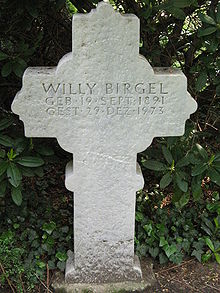Quick Facts
Biography
Willy Birgel (19 September 1891 – 29 December 1973), born Wilhelm Maria Birgel, was a German theatre and film actor.
Career
Birgel began his acting career before World War I on the stage in his native city of Cologne, and came to movies rather late. He was about 43 years old before he got his first major film role as the English Camp Commandant in Paul Wegener's Ein Mann will nach Deutschland (roughly translated A German Wants to Get to Germany or A German Wants to Go Home). This UFA-production that premiered on 26 July 1934, portrays a German engineer living in South America who hears in 1914 of war in Europe. Realising his obligation for his fatherland, he sets out for Europe, joined by a German comrade. The journey to Germany involves physical hardships, treacherous terrain, and hostile seas, obstacles faced by patriots who have only one thought: to return home to Germany to help a fatherland under attack. The film spoke of the kind of German values that were emphasized in Nazi Germany.
Similar films made by Birgel for the National Socialist Regime include Unternehmen Michael (1937), Feinde (1940) and Kameraden (1941). In 1937, Reichspropagandaminister Joseph Goebbels named Birgel Staatsschauspieler or roughly Actor of the State, the highest honor Germany had for actors at the time. Besides the propaganda films, Birgel starred in a number of popular movies such as Der Fall Deruga (1938), becoming an unlikely public favorite.
After World War II, Birgel was on the Allied black-list and did not make another film until 1947. By the 1950s, he was back to his pre-war popularity, often appearing with German film superstar Hans Albers. In the 1960s, Birgel was able to make the transition to television.
Death

Birgel died in 1973 of heart failure at Dübendorf near Zürich. He was buried at the Melaten Cemetery in his birth city, Cologne.
Selected filmography
- Count Woronzeff (1934)
- Black Roses (1935)
- One Too Many on Board (1935)
- The Traitor (1936)
- Ride to Freedom (1937)
- To New Shores (1937)
- Men Without a Fatherland (1937)
- Fanny Elssler (1937)
- Faded Melody (1938)
- The Deruga Case (1938)
- The Blue Fox (1938)
- Maria Ilona (1939)
- Kongo-Express (1939)
- Enemies (1940)
- Riding for Germany (1941)
- Diesel (1942)
- I Need You (1944)
- Between Yesterday and Tomorrow (1947)
- Chased by the Devil (1950)
- When the Evening Bells Ring (1951)
- Heidi (1952)
- Don't Ask My Heart (1952)
- Stars Over Colombo (1953)
- The Chaplain of San Lorenzo (1953)
- Captain Wronski (1954)
- Heidi and Peter (1955)
- Frau Cheneys Ende (1961)
- No Shooting Time for Foxes (1966)
